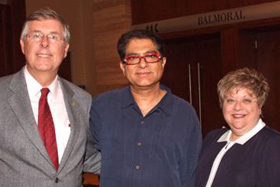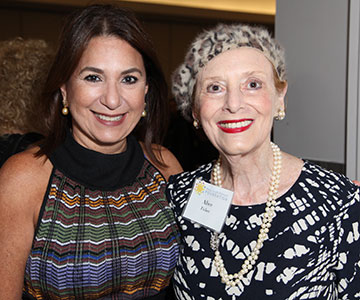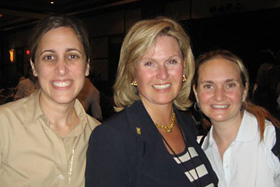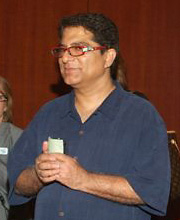A Healthy Reality
Deepak Chopra, Donna Shalala and Well Being/Being Well


“Science is bringing us to a deeper understanding of nature… The future does not belong to survival of the fittest. It belongs to survival of the wisest.”
Poignant words from a powerful thinker, yet only a sampling of the brilliance Deepak Chopra, M.D., displayed during his hour-long keynote address at UM/Sylvester’s Well Being/Being Well Conference on Healthy Living at the InterContinental Hotel.
The inaugural event assembled nearly 600 participants with seminars ranging from surviving cancer, to men’s health, to creating a personal life plan, to simply feeling better.
“All of the faculty who are presenting are UM physicians and researchers,” said Elsie Howard, event chair and UM/Sylvester Board of Governors member. “Whether it’s Jerry Goodwin, director of the Sylvester Comprehensive Cancer Center, or Joyce Slingerland, director of the Braman Family Breast Cancer Institute, we have brought together many chiefs of service, leading physicians, practitioners, holistic practitioners, wellness, nutrition and exercise experts with the goal of teaching people how to stay healthy or how to get healthy.”
The seminar on raising healthy children was chaired by Jennifer Elegant and Liz Brown. “This topic is very important to both Liz and me since we’re in the world of moms and dads,” said Elegant. “Today we covered topics that included separating fact from fiction. Is breast feeding better than bottle feeding? (Yes.) Should people who breast feed supplement? (Yes, Vitamin D.) How should we prevent childhood obesity? (By limiting television and computer usage.) Basically, wellness begins before birth and the choices the parent makes during the prenatal period can lay the foundation for the rest of a child’s life.”

The morning session featured a keynote address from University of Miami President and former U.S. Secretary of Health and Human Services, Donna Shalala, Ph.D.
“She talked about University of Miami Health – which is now U Health and Universal Health Care – and what she thinks needs to happen in the United States,” said Howard. “In a nutshell, she (Donna Shalala) thinks we need a new health plan. She said that none of it is working. But in the interim, while everybody is figuring it out, UM is leading the way with the Genome Project as one of the great research universities.”
But with all of the education and speakers and healthy energy that engulfed the Intercontinental Hotel, the highlight was clearly the lunchtime speech by Deepak Chopra. Without the use of notes, Chopra delivered an inspiring address that brought the mind, body and universe together with science acting as the unifying element.
“In the deeper reality,” he said, “we are one breath. In the deeper reality, we are one mind. In the deeper reality, we are one consciousness. And in the deeper reality, we are one body as well – the body of the universe.”
In addition to the broad reaching topics of consciousness, the universe and society’s collective role in it, Chopra also covered subjects of a more personal nature like the psychology behind happiness and love. He spoke of the happiness formula: brain set point, conditions of living and making other people happy.
“The brain set point determines whether when looking at a situation, you see a problem or an opportunity,” he said. “When some people see a certain situation, they see a problem, where as other people, happier people, can look at the same situation and see a creative opportunity.”

According to Chopra, the brain set point makes up roughly 40 percent of a person’s ability to be happy, where as conditions of living make up less than eight percent – which harkens back to the timeless cliché that money cannot buy happiness.
The most dominant aspect of Chopra’s happiness formula is the act of making other people happy, which is a function of relationships. According to Chopra, the ability to be happy has far-reaching biological consequences that directly influence an individual’s health.
Chopra’s speech was truly enlightening and yet another example of Miami and its institutions having the ability to attract world-class talent, whether in entertainment, design, athletics, or in this case, science. This event had true significance for our community and the University of Miami once again stepped to the forefront by making it accessible for the public to learn and benefit from its reach and reputation.


